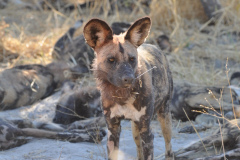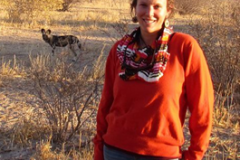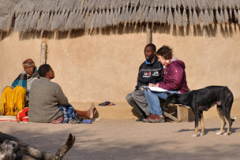(Lycaon pictus)
African Wild Dogs (Lycaon pictus) are highly endangered in Botswana because of habitat encroachment from human population pressure and land-use practices, and encounters with farmers and community members who perceive them as threats to livestock and livelihoods. Valli Fraser-Celin joined our research team as a Masters student in 2012 and transferred to the PhD program in September 2013.
Valli's project explores the impacts of Kalahari Wild Dogs on community development and livelihoods in Botswana. She completed three months of fieldwork in the Central Kalahari from May through July 2013 (with assistance from James Tsietsi, Alice Hovorka and Mark Hovorka) where she collected data from 80 people in two study sites, namely the Motopi area, Boteti District and the Molepolole area, Kweneng District. These sites correspond to two wild dogs collared by the Kalahari Research and Conservation Group, led by Dr. Glyn Maude (University of Bristol), with whom we collaboratied to bridge social and biological datasets.
Findings from these areas confirm the presence of several wild dog packs; they also reveal people are losing cattle to the dogs and fear interactions with them. Government compensation for livestock depredation is offered but viewed as limited. Conservation interests and agricultural activities are increasingly in conflict with wild dogs, people and their cattle all at risk. Valli returned for a second field season in January through July 2015 to continue investigating the lives of wild dogs.
Her work received generous funds from a Vanier Scholarship, Fonds de Recherche Société et Culture Quebec, two Ontario Graduate Scholarships, as well as the Latornell and Summerlee Scholarships from the University of Guelph. Her work was supported by a research permit from the Department of Wildlife and National Parks.




